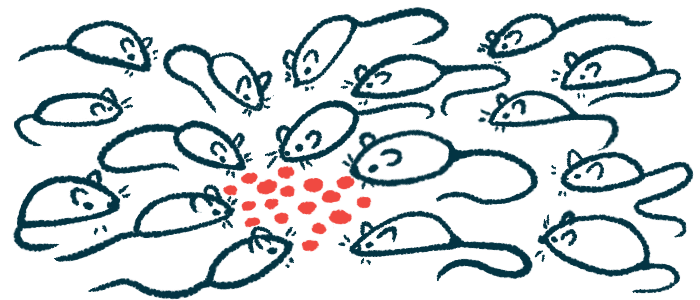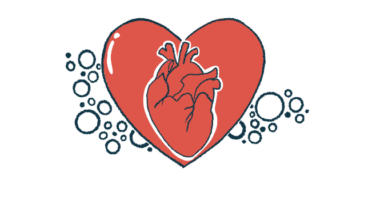High Zinc Triggers Signs of Cushing’s in Postmenopausal Mice
Obesity, diabetes, weight gain also observed in mice fed high-zinc diet

High levels of dietary zinc induced signs of Cushing’s syndrome in a postmenopausal mouse model, a study suggested.
Weight gain, obesity, and diabetes were also seen in postmenopausal mice fed a high-zinc diet. Tests in postmenopausal women were consistent with these findings, with higher blood zinc levels correlating with obesity and high levels of cortisol, the hormone found in excess levels in people with Cushing’s.
In model mice, treatment with hormone precursors prevented zinc-induced obesity and normalized cortisol levels.
According to researchers, these findings support further research on hormone precursors to prevent obesity in postmenopausal women in controlled clinical trials.
The mouse study, “Excess dietary zinc drives a Cushing’s-like syndrome in ovariectomized mice – Implications for postmenopausal obesity,” was published in Biochemical and Biophysical Research Communications.
Postmenopausal women are more likely to become obese and develop metabolic syndrome — a group of risk factors that increase the likelihood of heart disease and include high blood pressure, elevated blood sugar, abnormal cholesterol levels, and abdominal fat.
It’s thought that a lack of the female sex hormone estrogen may promote obesity in postmenopausal women, but how this occurs is unclear.
Before menopause, estrogen is produced by the ovaries as well as the adrenal glands, while estrogen production is limited to the adrenals after menopause. These glands also produce cortisol, a glucocorticoid hormone that plays a key role in regulating energy balance, blood sugar and fat metabolism, and sex hormone production.
Researchers in China analyzed mice whose ovaries were surgically removed to mimic menopause (Ovx) to learn more about obesity in postmenopausal women. Mice used as controls underwent sham surgery without ovary removal.
Testing with high-zinc diet
Because zinc is known to participate in metabolism and hormone function and its been suggested as a supplement for postmenopausal women, the researchers also tested its impact in Ovx mice. Both ovary-deficient and sham mice were fed a regular diet supplemented with 30 parts per million (ppm) of zinc and a high-zinc diet supplemented with 150 ppm zinc.
The team first confirmed that significantly high levels of zinc were in the bloodstream of mice fed with the high-zinc diet. Surprisingly, only mice lacking ovaries and fed a high-zinc diet had progressive weight gain, becoming severely obese after 20 weeks (4.6 months) of treatment. Food intake differences between the groups were not significant.
Ovx mice also had impaired glucose tolerance, decreased insulin sensitivity, and a significant reduction in blood insulin levels at later stages of treatment — all signs of diabetes. Levels of cortisol and corticosterone, a form of cortisol found only in rodents, were also much higher — a hallmark sign of Cushing’s in humans.
“Overall, the data show that high [zinc] intake induced over secretion [production] of glucocorticoids, obesity, and diabetes mellitus, and drove Cushing’s like syndrome in Ovx,” the researchers wrote.
Experiments to see what led to zinc-mediated corticosterone production in Ovx mice revealed zinc induced several signs of abnormal adrenal function and led to increased levels of an enzyme involved in producing glucocorticoids.
Adrenocorticotropic hormone (ACTH), which triggers the excessive production of cortisol in Cushing’s disease due to noncancerous tumors in the brain’s pituitary gland, was unaffected in these mice, indicating high cortisol levels were “independent of the pituitary and likely resulted from primary adrenal overactivity,” the researchers wrote.
As expected, estrogen and androstenedione, an estrogen precursor, were significantly reduced in Ovx mice fed a regular zinc diet, but were even lower in those on the high-zinc diet. Staining experiments revealed zinc built up in the adrenal glands of mice fed a high-zinc diet, but not in the ovaries.
High zinc correlates to weight gain
To investigate how this was relevant to people, researchers collected blood samples from 750 postmenopausal women. Tests showed higher zinc, but not iron, manganese, or calcium, positively correlated with higher body fat content, waistline girth, fasting blood sugar, and blood fat. Also, blood cortisol levels were elevated and associated with higher zinc, fasting blood sugar, and total fat levels.
“The evidence indicates that [zinc] was positively correlated with glucocorticoid level and visceral obesity indicators in women after menopause,” the researchers wrote.
Tests in 187 obese postmenopausal women found that high zinc levels, but not other minerals, were associated with lower levels of estrogens and hormone precursors such as androstenedione and dehydroepiandrosterone (DHEA), as well as high levels of cortisol.
Finally, the team treated high zinc-fed Ovx mice with an estrogen called estradiol and androstenedione to confirm the connection between adrenal abnormalities and dietary zinc-induced Cushing’s-like symptoms. Mice treated with either substance showed no signs of zinc-induced weight gain and obesity, with no change in food intake.
Importantly, the treatments prevented the formation of abnormal adrenal tissue and normalized corticosterone levels in the bloodstream, suggesting androstenedione and DHEA “might be used to prevent excess zinc and high cortisol-related postmenopausal obesity.”
“Based on our findings, randomized controlled trials of the prevention of excess zinc-related postmenopausal women by DHEA or avoiding zinc-rich food intake are highly warranted,” the researchers wrote.







